- The Moneycessity Newsletter
- Posts
- How Elon Musk Convince TESLA Shareholders to Pay Him $55.8 Billion Salary
How Elon Musk Convince TESLA Shareholders to Pay Him $55.8 Billion Salary
If you have Tesla stocks, you might have heard about the court case regarding Elon Musk's $55.8 Billion pay package as CEO of Tesla. Is this amount justified and will you be affected as a shareholder? After reading through all of the court cases and all of the pay packages that Musk ever received, and then also looking into whether the Board of Directors and Compensation Committee are honest and loyal to Musk, I have formed an opinion and I'm sharing all about it today.
$55.8 Billion is an insane number.
Just when I heard the number alone, I was like, okay, that’s ridiculous.
If I was a Tesla shareholder, I’d be pissed. Then I read that 73% of Tesla shareholders voted in favor of the pay package.
I’ve got to be missing something. Surely there is some more context here that the headlines are not giving me.
What did Elon Musk and the board of directors pitch to shareholders?
Why would they agree to this?
Were Tesla shareholders misled somehow?
On the go? Watch the video HERE.
The Pay Package
Below is an excerpt from Tesla’s statement to shareholders on the specifics of Elon Musk’s new pay package.
“Elon will receive no guaranteed compensation of any kind. No salary, no cash bonuses, and no equity that vests by the passage of time. Instead, Elon’s only compensation will be a 100% at-risk performance award.” — Tesla’s Board of Directors
Okay, so if Elon doesn’t perform, he gets nothing.
“The award consists of stock options that vest only if Tesla achieves specific milestones which if fully achieved, would make Tesla one of the most valuable companies in the world, okay, with a market capitalization of at least $650 billion, more than 10 times today’s value.” — Tesla’s Board of Directors
Interesting.
Elon doesn’t get paid at all if he doesn’t hit the milestones.
Of course, we are looking at this now in hindsight, so maybe that’s a little bit unfair because he has reached all the milestones.

Elon Musk Will Perform or Get Nothing
Elon Musk points out here that if he only can increase Tesla’s market cap by 80 or 90%, then he would receive nothing so there is quite a bit of risk here in accepting this payment plan.
In the statement to shareholders, this graph gives a little bit more perspective on why Tesla shareholders were warm to the new performance plan pay package.

Tesla Market Cap Growth
In 2012, Elon had a similar plan where he had to perform or else he would get no payment at all. As you can see, Elon had more than 17Xed Tesla’s market cap from $3.0 billion to $52.48 billion.
To be fair, that is a huge profit for shareholders.
Of course, the directors attribute this huge success to the performance payment plan at the time. Elon was able to create huge value for shareholders before, maybe he could do it again.
Anyway, let’s dig a little bit deeper and see exactly what Elon’s pay package was all about.
This chart here compares his 2012 pay package to his new 2018 pay package.

CEO Compensation Comparison
% Compensation at Risk: 100% both before and now means if Elon doesn’t hit that first milestone then he’s going to get nothing over the 10-year period.
Market Capitalization at Time of Reward: What is Tesla worth at the time of reward?
% Outstanding Shares Vesteing per Tranche: The tranche is just the milestone that he hits. This is what percentage of Tesla’s outstanding shares is Elon able to purchase at a good price and I’ll get into that later. This is his reward for hitting each milestone.
Market Capitalization Increment per Tranche: For 2018, he has to increase it by $50 Billion, so the first reward is gonna be $100 Billion. The third reward would be a $150 Billion net worth up to $650 billion worth of Tesla.
When the 2018 plan was drafted, Tesla’s market price at that time was about $50 billion. So Elon’s logic is, that if I double the share price, I get a reward. If I triple the share price, I get a reward. And so on.
This payment plan is so much bigger than the previous one because he’s getting 1% of Tesla shares every time instead of just 0.5%.
In reality, what he’s getting is an option to purchase shares at a favorable price. The strike price of his option, which is the price at which he gets to buy the shares, is the share price in January 2018.

Tesla Price Doubling — Illustration by author
So at the time, the share price of Tesla was $350, if he’s able to double the share price and get the share price to $700, he has the option to buy it at $350 which is a profit of $350 per share. And that’s 1% of Tesla.
So every time he doubles that strike price, he’s able to get a better and better deal on more and more shares of Tesla.
Now when Elon executes these options and buys the shares at the better price, it’s important to remember that he’s not buying shares from other shareholders. Tesla is issuing more shares, which has a diluting effect on Tesla’s shareholders.
What do you mean by dilution?

Pizza Slice Dilution — Illustration by author
If I have a slice of pizza and I promise you, I’m going to give you one slice of pizza and I’m going to have one slice of pizza. We split this pizza 50/50. But then I go behind your back and I promise my neighbor and his friend that I’ll also give them a slice of pizza. You’re still getting your one slice of pizza but now it’s only worth a quarter of the whole pie. You’ve been diluted because I have issued more slices of pizza.
It’s the same with Tesla.
Now, Elon is buying those shares, so he is injecting more cash into Tesla, but he’s buying those shares at a reduced share price. He’s not putting the full worth of those shares back into Tesla so there is definitely a diluting effect, which is bad for shareholders.

Tesla Share Dilution — Illustration by author
If Elon doesn’t perform, he doesn’t get paid. If he performs really, really well, he gets paid a whole lot.
Elon’s providing a lot of value to shareholders, and the shareholders are getting a little bit diluted, yes, but Elon created all of this value. Why should they be so upset about a little bit of dilution?
And Tesla shareholders clearly agreed. 73% voted in favor of this pay package.

73% of Tesla Stockholders Voted in Favor of this Pay Package
The last thing I want to look at before moving on to the court’s opinion and why the court thought that Elon should lose all that pay, I want to look at what other car companies did during that same time period.
This video by Ranking Charts gives us a visual of the 20 years following 2001 of the top 10 car manufacturers in the world.
In the first ten-year period from 2001 to 2011, only Volkswagen succeeded in more than 2Xing its market capitalization. If all of these CEOs from the top 10 car manufacturers in the world had Elon Musk’s same performance package, none of them would have been paid between 2001 and 2011.
As we let the video play past 2011, you can see how much Tesla absolutely popped off. Starting in 2018 specifically, when Tesla shareholders agreed to his performance plan, the market cap of Tesla exploded, dwarfing all of the other car manufacturers.
I mean, that’s kind of hard to argue with.
How could the court possibly justify taking away Elon’s compensation after doing that?
The Court Opinion
Let’s read directly from the Delaware Court’s opinion: Was the richest person in the world overpaid?
“With a $55.8 billion maximum value, the plan is the largest potential compensation opportunity ever observed in a public company by multiples of order of magnitude 250 times larger than the contemporaneous median peer compensation and over 33 times larger than the plan’s closest comparison which was Musk’s prior compensation plan. This post-trial decision enters judgment for the plaintiff, finding the compensation plan is subject to review under the entire fairness standard.” — Delaware Court
This means that Elon Musk and Tesla’s board of directors are effectively now guilty until proven innocent instead of the other way around.
They must prove now beyond a doubt that the pay package is fair instead of the plaintiff or the accuser proving that the pay package is unfair.
“Normally for a disputed business transaction, the burden of proof is on the plaintiff or the accuser. This is called the business judgment rule.” — Delaware Court
This rule only applies when at least one side of the transaction is both independent and disinterested.
Elon Musk is on one side of the transaction. He’s receiving the pay so he is definitely interested.
We’re going to be focusing on the other side. Elon Musk has to prove, that the compensation committee is both independent of Elon and disinterested in Elon’s payment.
And it does make sense that we want a higher standard of proof in situations like this. It is a major red flag whenever one side can control the other, or if both sides can be proven to be interested in the outcome.
On that note, just because there is a red flag doesn’t mean something went wrong. You have to prove now that something didn’t go wrong.
So are both parties interested?
Does Musk Control Tesla?
In this case, the court has determined that Elon is a controlling shareholder.
A controlling shareholder is somebody who has enough control over Tesla, which means they have enough control over the board of directors and the compensation committee, such that Elon could essentially be setting his own salary to some extent.
This means that both sides of the transaction are not independent.
Now my question is, why does the court say that Elon is a controlling shareholder especially when Elon doesn’t control 51% of Tesla’s shares? He only owns 21.9% of Tesla, to be precise.
“ Does Musk control Tesla? Delaware courts have been presented with this question thrice before and essentially in other cases, they decided to dodge the question. But this court will go boldly where no man has gone before.
So in addition to his 21.9% equity stake, Musk was the paradigmatic superstar CEO who held some of the most influential corporate positions: CEO, chair, and founder. He enjoyed thick ties with the directors tasked with negotiating on behalf of Tesla, and he dominated the process that led to the board's approval of his compensation plan. At least in this transaction, Musk controlled Tesla.” — Delaware Court
So the court has made their case.
Was Musk a superstar CEO? Yeah, I think I can see it.
Was he a big-time shareholder? Nearly 22%? Yeah, that’s a big-time shareholder.
But did he really have thick ties with the directors of the board and the members of the compensation committee?
1. Ehrenpreis
The first committee member is Ehrenpreis.
They have invested tens of millions of dollars in Musk-controlled companies. They’ve been a member of the board since 2007. And then between 2011 and 2015, they made $200 million from options granted by Tesla which is controlled by Elon.
So essentially, he got paid $200 million by Elon.
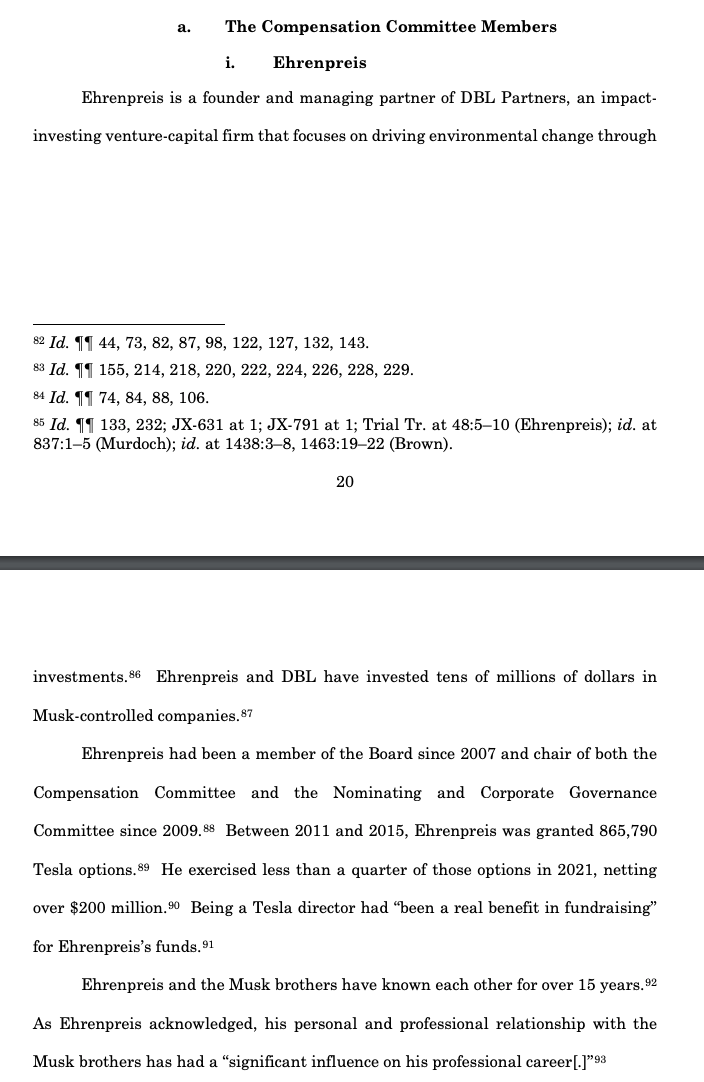
Ehrenpreis Relation
2. Buss
The second committee member is Buss.
This person served as the SolarCity CFO under Elon Musk. He was compensated $17 million as a Tesla director and realized $24 Million selling shares that he received as compensation from Tesla. That’s Musk basically. Buss owed roughly 44% of his net worth to Musk entities.
That’s a strong connection.
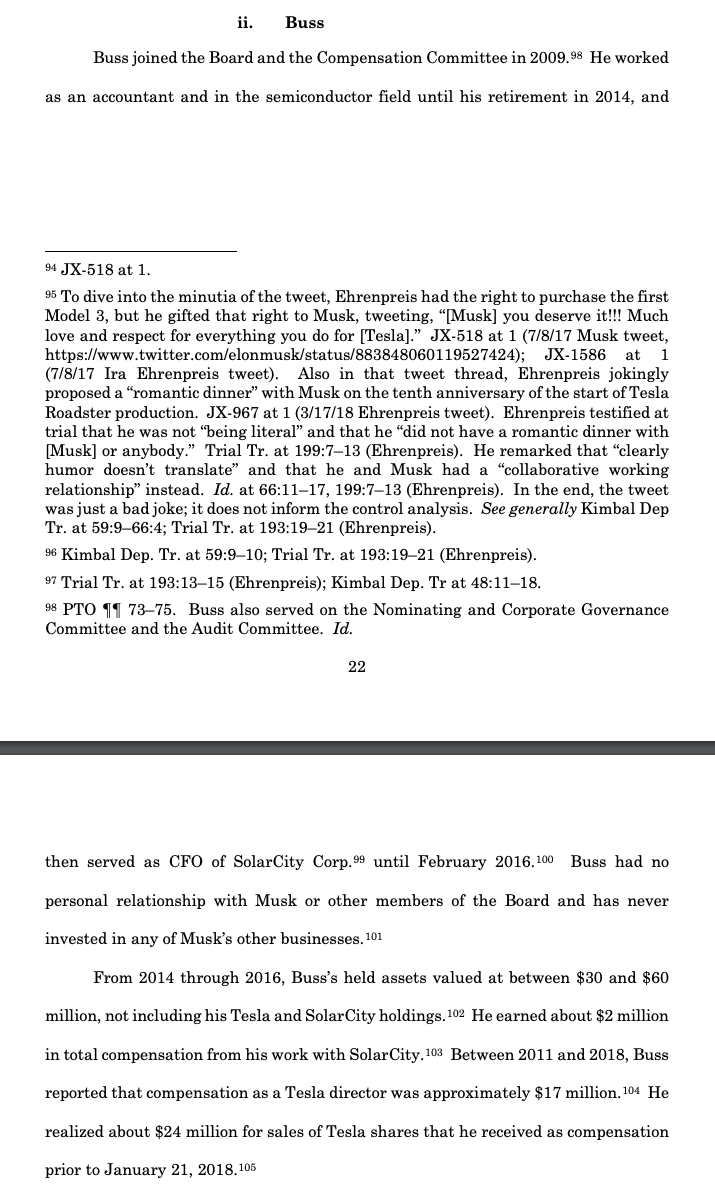
Buss Relation
3. Denholm
Third, we have Denholm.
Denholm joined the board in 2014. She received the vast majority of her wealth from Tesla as a director. She ultimately received $280 million through sales of Tesla options which she received as part of her director compensation.
She described this as “life-changing”.

Denholm Relation
4. Gracias
Fourth, we have Gracias who joined the board in 2007.
As of 2017, Gracias was the third largest individual investor in Tesla. As of 2021, Tesla stock was worth approximately $1 Billion. All told, Gracias and his fund have netted billions of dollars by investing in Musk companies, many of which were made only with Musk’s personal invitation.
Another strong connection.

Gracias Relation
5. Murdoch
Fifth, Murdoch goes on family vacations with Musk and is heavily invested in Musk-controlled entities. He owns tens of millions in SpaceX which would require an invitation to invest since it is a privately owned company.
Once again, thick ties.

Murdoch Relation
6. Rice
Finally, we have Rice, who does not seem to have a super strong connection with Musk, but this would be the only member on the committee who is not strongly tied both monetarily and with personal ties to Musk.
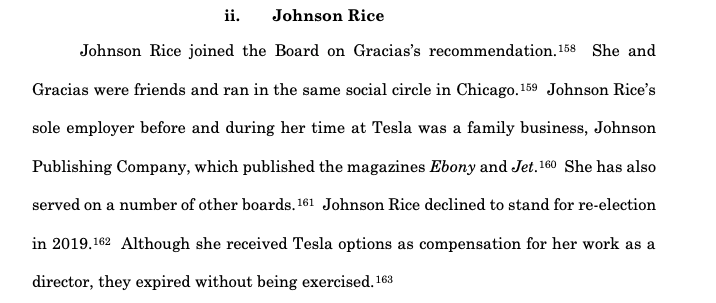
Rice Relation
So, it looks like the vast majority of the compensation committee owes a huge portion of their net worth to either Tesla, who we have confirmed Musk effectively controls, or they owe it to Elon Musk himself.
Effectively, it seems like Elon Musk was negotiating the terms of his compensation with himself.
So now you might be asking: Brian, why do I care about all this? Why do I care about Elon’s relationship with the committee when they spelled out the details of the compensation package and let the shareholders vote on it? And they overwhelmingly voted for it, 73%.
Is the Compensation Committee Honest to the Shareholders?
Before I show you the court’s argument for why the directors and the compensation committee failed in their fiduciary responsibility, I want you to consider a situation where you’re buying a house.
You have hired a real estate agent, and that real estate agent has a fiduciary responsibility to you.
You find your dream house, you show your agent and you say “I got to have it. This is the house. This is the one.”
So your real estate agent says “All right, based on my expertise, based on the current market conditions, and all the time I spent researching this house, it is my professional opinion that you need to offer $50,000 over asking, or you’re not going to get this house.”
In your mind, you’re like, “Okay, I trust this person. This person has a fiduciary responsibility to me. They’re acting in my best interest.”

Real Estate Agents Not Upholding Their Fiduciary Duty
Just like the Tesla shareholders knew who they were getting as a CEO, you knew the house you were buying.
Would your opinion change if you found out that your real estate agent was heavily connected to the homeowners of the house that you’re trying to buy?
Would your mind change if you found out that the homeowners were the ones who pitched the $50,000 and your real estate agent just went along with it?
This is kind of similar to what happened with Tesla.
The board of directors and the compensation committee have a fiduciary responsibility to their shareholders.
So what does fiduciary responsibility mean?
According to Harvard Business School, fiduciary duties to investors include four aspects:
Duty of obedience
Information
Loyalty
Care
I want to draw attention to two of these.
1. Duty of Information
This requires candor, the obligation to be open and honest with shareholders. The board did not properly disclose to shareholders how this compensation package came into being.
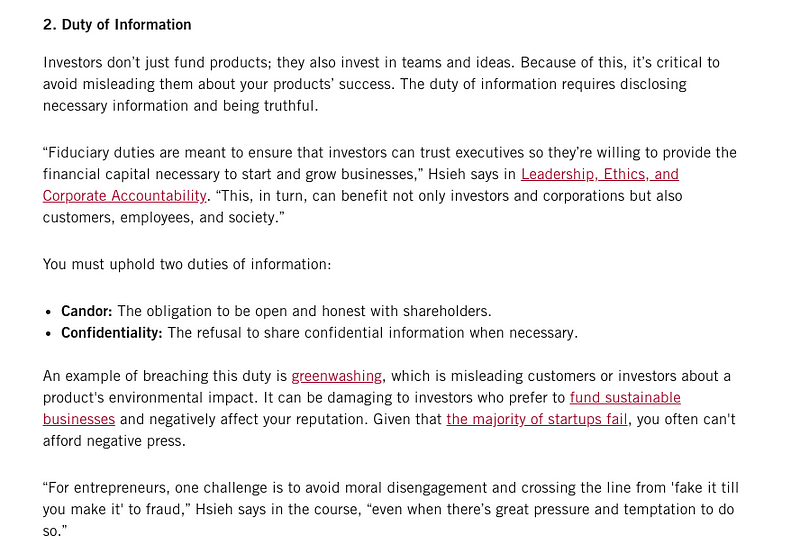
Duty of Information
2. Duty of Loyalty
Loyalty requires acting in the shareholder’s best interests ahead of your own best interests. And the board did not do this.

Duty of Loyalty
So how does the court prove these two claims?
Is the Compensation Committee Loyal to Elon Musk?
The first claim is that the board of directors and the compensation committee did not properly describe how the details of the compensation plan were created.
“ In crafting this award, we were mindful of Elon’s existing stock ownership levels and the strong belief that the best outcome for our stockholders is for Elon to continue leading the company over the long term.
We created the award after more than six months of careful analysis with a leading independent compensation consultant as well as discussions with Elon who along with Kimball, who is Elon’s brother-in-law, otherwise recused themselves from the board process.
In crafting this award, we were mindful of Elon’s existing stock ownership levels and the strong belief that the best outcome for our stockholders is for Elon to continue leading the company. We created the award after more than six months of careful analysis with a leading independent compensation consultant, as well as discussions with Elon.” — Tesla’s Board of Directors
So they kind of downplay the discussions with Elon and they say that we created this after months of careful planning.
“ We recommend that you vote for the proposed CEO performance award.” — Tesla’s Board of Directors
Discussing with Elon his compensation is not necessarily a bad thing. They should both be advocating for their respective sides. Elon should be advocating for himself, and the compensation committee should be advocating for the shareholder’s best interest.
At this point, you would expect to see some pushback from the board of directors or the compensation committee.
But in reality, the only change that the compensation committee came up with was the operational milestones to go along with Elon’s market cap milestones. And they did not try to lower his compensation from 1% back down to 0.5% or anything like that.
The reality of the situation was that Elon Musk was the one who was calibrating his own deal. It really wasn’t the compensation committee that was pushing back. It was Elon.
There were two separate times that he tried to change the compensation to lower it, to make it a little bit more reasonable.
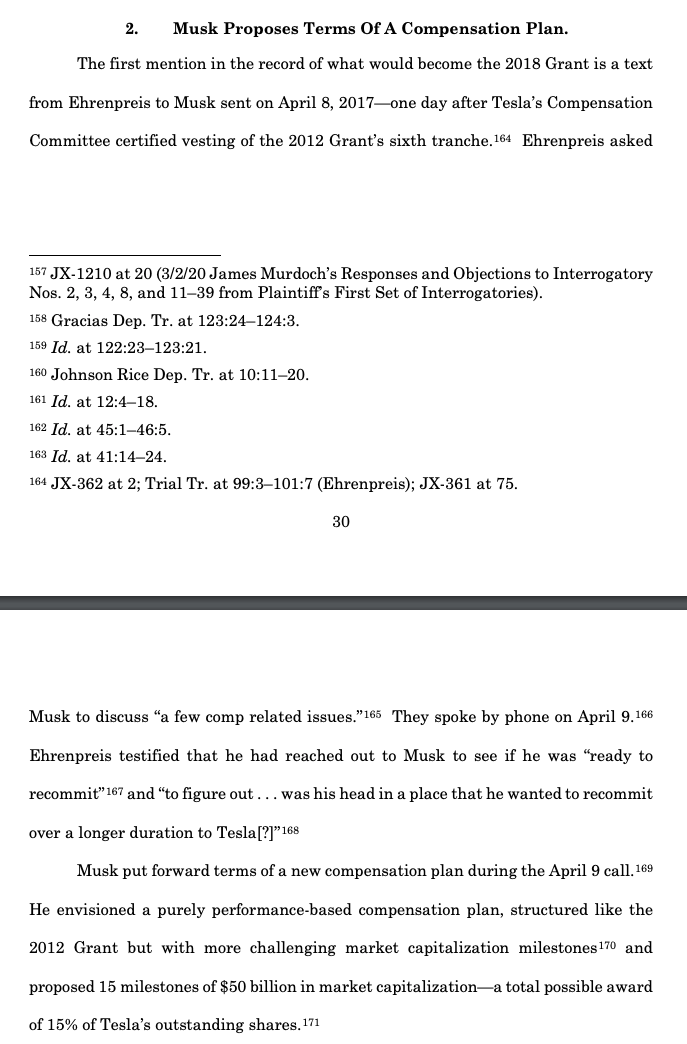
Musk Proposes His Own Compensation
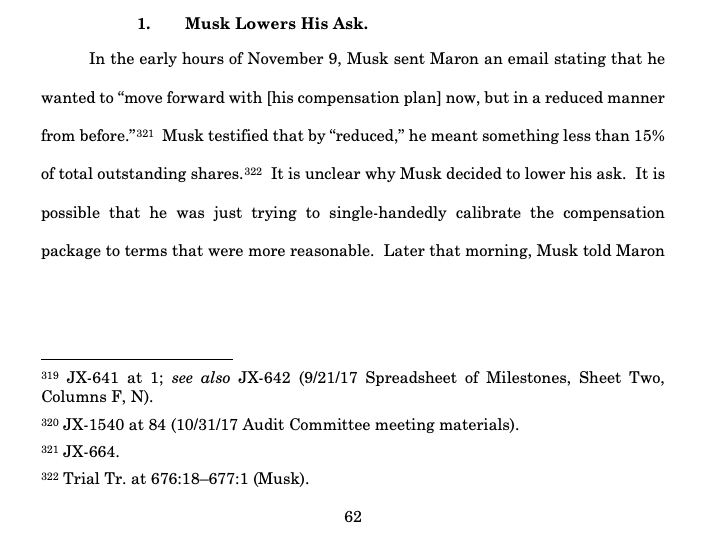
Musk Lowers His Ask
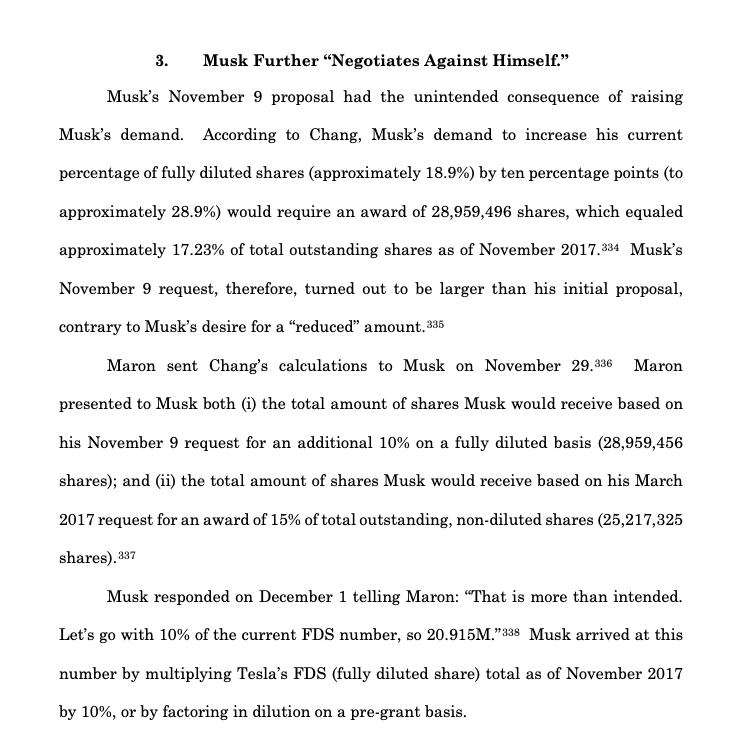
Musk Negotiates Against Himself
That should have come from the compensation committee.
The only thing that the compensation committee did during the negotiations was add the Operational Milestones to go along with the Market Cap Milestones.
And that was a feature that also appeared in the 2012 grant. So as long as Elon is producing organic growth, it’s really not that much more difficult.

Tesla Profitability Milestones
The second thing they did was in the very end, they pushed Elon from 10 tranches of fully diluted shares to 12 tranches of non-diluted shares.
It technically made it a bit more difficult for Elon because he would have to hit 12 milestones instead of 10, but the compensation would be the same.

The Final Compensation Package
When you look at the actual evolution of the compensation plan, it really paints a much different picture than what the letter to shareholders described.
1. Duty of Information
The judge says that the board of directors and the compensation committee were not fully transparent with shareholders and thus they have failed this fiduciary responsibility.
2. Duty of Loyalty
The second aspect of the fiduciary responsibility that the Board of Directors and Compensation Committee failed on was loyalty.
They weren’t acting in their shareholders' best interest. If they were, then they would have come up with some plan, any plan, that would have resulted in keeping Elon Musk for less pay.
There is no way that 1% of Tesla for each tranche was the minimum that Elon was willing to stay on board for.
The fact that they did not push back at all in reducing that compensation highlights the fact that they were more interested in appeasing Elon than they were in creating the most value for the Tesla shareholders.
A perfect way to illustrate this is by comparing it to their 2012 plan.

Performance Award Comparison
In 2012, Tesla’s market cap was 17X less than it was in 2018 when they put the new compensation plan into effect. And the rewards were half as much: 0.5% of $3 Billion versus 1% of $50 Billion.
That’s a huge difference. They should have been at least pushing for a similar compensation plan Elon got in 2012.
The whole process seemed to be set by Elon Musk for Elon Musk.
Don’t get me wrong. I will be the first to admit that Elon Musk has absolutely killed it with Tesla as far as creating value for his shareholders. And I absolutely want Elon Musk at the helm.
If I were a Tesla shareholder, I would wish Elon to be the CEO. But that does not mean that I want to pay any arbitrary amount to keep him there.
So What Now?
In my opinion, the court was right to overturn this ridiculous payment package, but they should have done it like 5 years ago when it was first put into place.
It is a little bit crappy to wait until he hits all the milestones and then say “Ah, you know what?”
I do feel for Elon in that sense.
If you are a Tesla shareholder, I want to know what is your opinion.
Do you think this pay package was worth it just to ensure that you’re keeping Elon as the CEO?
Did you want to see the compensation committee at least negotiate a little bit to get them down to 0.5% per tranche?
On the other hand, if you are not a Tesla shareholder but are looking for the next big investment, there are some exciting developments in the cannabis sector. I go over the latest leaks regarding rescheduling cannabis to schedule III HERE. If this goes through, we could see some huge movement in cannabis stocks in the short term.
How Elon Musk Convince TESLA Shareholders to Pay Him $55.8 Billion Salary


Reply